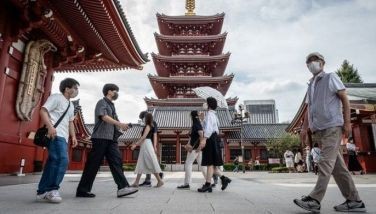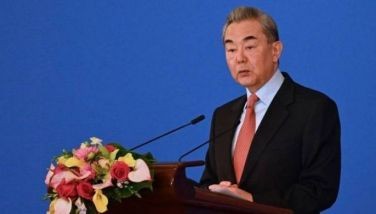Activists: Airstrikes hit jihadi targets in Syria
MURSITPINAR — The US-led coalition has launched several airstrikes on Islamic State group positions in Syria, mainly in and around the town of Kobani near Turkey, where Kurdish fighters captured a strategic hill and brought down the jihadists' black flag, activists and a Kurdish official said yesterday.
The battle for Kobani is still raging despite more than two weeks of airstrikes by the US-led coalition, raising concerns over whether the air campaign will be enough to degrade and eventually destroy the extremist group, which controls vast swaths of Iraq and Syria.
"Over the past night there have been very intense airstrikes by the coalition that targeted several Daesh positions in and near Kobani," said Idriss Nassan, deputy head of Kobani's foreign relations committee, using an Arabic acronym to refer to the Islamic State group.
One of the airstrikes targeted the Tel Shair hill that overlooks parts of Kobani, Nassan said, and Kurdish fighters later captured the hill and brought down the black flag of the Islamic State group. The extremist group still controls more than a third of the predominantly Kurdish town.
An Associated Press journalist on the Turkish side of the border confirmed that the Islamic State flag was not flying yesterday afternoon on the hill.
The Britain-based Syrian Observatory for Human Rights, which has a network of activists across Syria, said there were at least five airstrikes since Monday night targeting Islamic State positions.
The fighting in and around Kobani has forced more than 200,000 people to flee across the border into Turkey and killed more than 500 people, mostly fighters from both sides.
The UN refugee agency said an increasing number of Syrian Kurds from Kobani are seeking shelter in the northern Iraqi province of Dohuk after crossing the border from Turkey. It said that on Friday, Kurdish authorities in Iraq opened a crossing near the Iraqi town of Zakho, easing the journey for the steady stream of people who last week had to pay smugglers $250 each to cross.
UNHCR said some 5,400 Syrians from Kobani have now entered Iraq, including 3,600 people in the last three days. Another 10,000 to 15,000 people are expected to cross in the coming days, it said.
Also in Iraq, Syrian Kurdish leader Saleh Muslim Mohammed, who heads the Democratic Union Party, or PYD, arrived in the Kurdish region to meet with local officials, said party spokesman Nawaf Khalil. He said Mohammed will be mostly talking to Iraqi Kurdish officials about Kobani.
In the town of Suruc on the Turkish side of the border, dozens of Kurds from Kobani who are held by Turkish authorities at a sports stadium have gone on a hunger strike to protest their detention, activist Mustafa Bani said by telephone.
Nearly 200 people, including women and children, from Kobani have been held in Turkey since last week shortly after they crossed the border, Bani said.
"Until now we don't know why we are being detained," he said, adding that the hunger strike, which began days ago, is to pressure Turkish authorities to explain why they are being held.
Turkey is concerned about the tide of refugees and wary of the People's Protection Units, the Syrian Kurdish militia defending Kobani. Ankara views the group as an extension of the Kurdish PKK, which waged a long and bloody insurgency in southeastern Turkey.
The Observatory and the Local Coordination Committees, a group of Syrian activists, said that in addition to targeting militants in Kobani, the coalition also struck the eastern town of Mayadeen in the oil-rich Deir el-Zour province. The Observatory said the airstrikes hit oil refineries near Mayadeen, sparking a huge fire.
The airstrikes in Syria by US and coalition forces began on Sept. 23. Among other things, they have been targeting small refineries operated by the Islamic State that provide a key revenue stream for the extremist group.
- Latest
- Trending
































